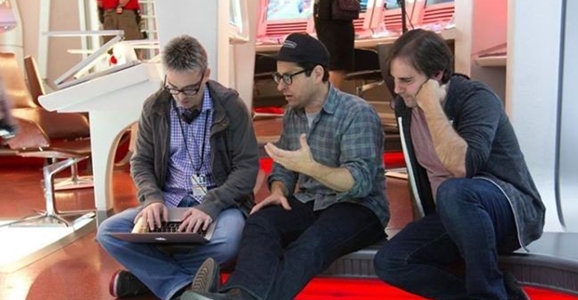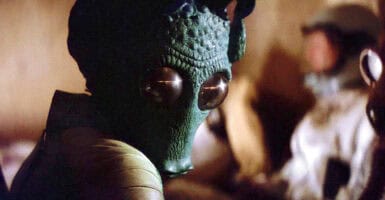Star Trek Into Darkness Writer On Listening To Fans (No, Really) And Trek’s Inevitable Return To TV
This article is more than 2 years old
Even if you never really pay attention to movie credits, if you’re reading GFR there’s a pretty good chance you recognize the name “Roberto Orci.” The co-writer of both of J.J. Abrams’ Star Trek films was already the subject of ire for many Trek fans who deem the rebooted timeline an unholy abomination. But after fans at a convention recently voted — ludicrously, in my humble opinion — Star Trek Into Darkness as the single worst movie of the franchise, Orci took to Twitter to badmouth disenchanted Trekkies, comparing them to children, calling them “shitty fans,” and telling them to “FUCK OFF!” He soon apologized, but it was too late. Fans who wanted to hate Abrams’ take on Trek now had a new totem on which to focus their rage. But to hear a seemingly humbled Orci tell it, the current Trek writers are listening to fans, and not just swearing at them. No, really.

In the aftermath of the whole Twitter meltdown, Orci appeared on the excellent Mission Log Podcast (transcribed by Trek Movie), where he discussed his own longtime love of Gene Roddenberry’s fictional universe, revealing that The Wrath of Khan was the first movie he ever saw in a theater. That might seem bitterly ironic to the contingent of fans who hate Abrams’ Trek movies, and most especially the use of Khan in last spring’s Star Trek Into Darkness. The recent movies have definitely favored action over intellect, but Orci says the duality of those two elements is what initially attracted him to the franchise when he was young.
The idea that smart people could be thinking their way through problems, I thought was interesting. No matter how smart you are and no matter how moral and how much you’re thinking, sometimes you must do battle. That was an interesting goalpost of the series for me. You can be a genius astrophysicist who cares about nothing more than to maintain the peace and yet you may still have to fire your phasers and your photon torpedoes.
You can argue about where the various Trek movies have fallen on that spectrum over the years — the Abrams flicks were hardly the first of the series to favor spectacle over deeper storytelling — but I think it’s safe to say that the ongoing format of a television show lends itself better to the latter, simply because a movie only gives you a couple of hours in which to do everything you need to do. So if the new films are primarily going to going to be summer popcorn fare, why not bring the franchise back to the small screen and let it do what it has traditionally done so well? While you might not expect it, Orci agrees.
I do think Star Trek is wonderful for TV. I think it should be both [TV and movies]. I saw a Next Generation movie, I won’t say which, but I thought ‘Ahh, it’s slightly succumb to the trappings of movie making. A lot of action and not enough philosophy.’ It’s interesting to read that criticism of some of the stuff we’ve done in the last two [films]. TV affords you [philosophy]. But, I do think that audiences are sophisticated enough that Star Trek can be Star Trek in both mediums now.
One of the complaints about Into Darkness, even from those who enjoyed it, is that it seems counterproductive to branch off a “new timeline” — which would in theory lend you enormous latitude to put the characters through new stories — but then return to the franchise’s most iconic villain when you’re only two films in. Orci insists that the third film will veer away from material already covered and explore something new.
In the first two movies, Paramount has been great in just trusting us in what we were going to do. You can’t blame the evil studio for whatever you hate. You have to blame us. My hope is that these movies have earned us the right to show another side of Star Trek that we have not fully shown yet. A genuine sci-fi mystery; that would be nice. The third one — and this is based slightly on fan response — the third one should just be unpredictable with as many new elements as possible.
Of course, many angry fans might scoff at the notion of Abrams, Orci, and Into Darkness co-writers Alex Kurtzman and Damon Lindelof actually listening to fan complaints, but he cites several changes in the second film that were purportedly made to address complaints about the original 2009 film:
1. We addressed Kirk’s quick ascension [to captain]. . . that’s why he’s demoted.
2. We addressed the brewery [engineering]. We went to San Francisco and got a proper warp core.
3. We attempted to try and grow the trifecta [Kirk, Spock, and Bones] by having Bones in there.
4. We tried to make Scotty less humorous, gave him meat to chew on. He resigns over the Enterprise’s mission not being about exploration.
Whether fans think those considerations were enough to counterweight their complaints about the film…well, let’s face it, at this point you already know whether you like Into Darkness or not, and this interview probably isn’t going to change that. But Orci throws even the angriest fans a bone: if you don’t like his version of the franchise, don’t worry. It’ll change. And keep changing. As Orci puts it, “Star Trek ain’t going anywhere. It’s going to outlive all of us. And it’s going to be translated into every kind of delivery system you can imagine. It’s not going away from TV either. It just depends on when it comes back and how it’s programmed against the movies.”
You can listen to the full Mission Log Podcast interview with Roberto Orci right here. And if you haven’t checked out the podcast as a whole, it’s definitely worth subscribing to. Hosts Ken Ray and John Champion are working their way through Star Trek‘s entire televised history, from the Original Series‘ original pilot, all the way through the finale of Enterprise. It’s good fun.












